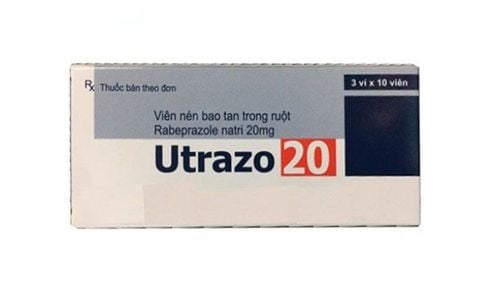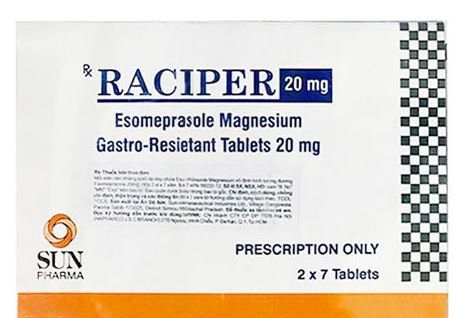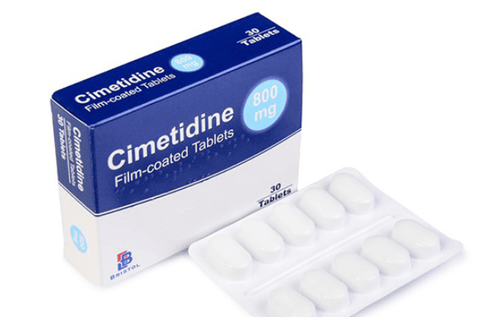This is an automatically translated article.
Bepracid is a drug belonging to the proton pump inhibitor group - reducing gastric acid secretion, used to treat gastroesophageal reflux disease - oesophagitis, peptic ulcer. Understanding the effects as well as complying with the indications and doses of Bepracid will help patients improve treatment effectiveness and prevent unwanted side effects.
1. What is Bepracid 20?
Bepracid includes the following ingredients:
Main ingredients: Rabeprazole Sodium 20 mg Other excipients: Povidon, Mannitol, Magnesium Oxid, Talc, Hypromellose, Magnesium Stearate, Triethyl Citrate, Titanium Dioxyd, Quinoline Yellow, PEG 6000. Rabeprazole Sodium has inhibits gastric acid secretion under normal and stimulated conditions by inhibiting the enzyme H+/K+-ATPase in parietal cells of the gastric mucosa. This is an enzyme that pumps acid, hydrogen or protons from parietal cells into the stomach, so Rabeprazole is considered a proton pump inhibitor. Rabeprazole, after entering the body, will bind to the enzyme H+/K+-ATPase, blocking the final stage of acid secretion by protonating Rabeprazole and converting it to an active sulfenamide in the parietal cells of the stomach. This active ingredient then binds to the cysteine of the proton pump to inactivate the enzyme H+/K+-ATPase, thereby reducing the amount of stomach acid.
2. Indications of the drug Bepracid 20 mg
Bepracid 20 mg is indicated in the following cases:
Gastroesophageal reflux disease (GERD) Gastric and duodenal ulcer progressing stage Zollinger-Ellison syndrome and pathological conditions with increased secretions other taste. In combination with antibiotic therapy for eradication of Helicobacter Pylori in patients with duodenal ulcer. Bepracid should not be used in the following cases:
Patients with a history of hypersensitivity to Rabeprazole, Benzimidazole derivatives (omeprazole, ezomeprazole, pantoprazole, ...) or any ingredient of the drug Pregnant women or are breastfeeding
3. Dosage and how to use Bepracid 20 mg
3.1. How to use Bepracid 20 mg is used orally for patients 12 years of age and older. Patients should take the entire Bepracid 20mg tablet, do not chew, break, or crush it because it can reduce the effectiveness of the drug. The drug is used in the morning before meals.
3.2. Dosage for each specific case Gastroesophageal reflux disease: 20 mg/time/day for 4-8 weeks. Do not use for more than 12 months Active stage peptic ulcer: 20 mg/day for 4-8 weeks in duodenal ulcer and 20 mg/day for 6-12 weeks in gastric ulcer. Zollinger-Ellison syndrome: Starting dose: 60 mg/time/day, increase or decrease dose based on patient response. The dose may be increased to 120 mg/day. When the dose is over 100 mg/day, it should be divided into 2 doses. Eradicate Helicobacter Pylori: Combination treatment for 7 days according to the regimen: oral (1 Bepracid 20 mg + 1000 mg Amoxicillin + 500 mg Clarithromycin)/time, twice a day Some unwanted side effects may occur in patients. common when using Bepracid 20 mg:
Common: diarrhea, headache, skin rash Uncommon: dizziness, fatigue, constipation, nausea, flatulence, itching In case of forgetting the drug, the patient does not Take the missed dose, continue to take the next dose as directed by your doctor. The highest recorded case of overdose was 80 mg. No clinical signs or symptoms of overdose have been reported to date. In case of overdose, the patient will be treated symptomatically and improve the general condition. No specific antidote for Bepracid is available.
4. Bepracide drug interactions
Bepracid 20 mg may interact if used concurrently with the following drugs and substances:
Drugs that depend on gastric pH: for example, Ketoconazole or Itraconazole are antifungal drugs, when used concomitantly with Rabeprazole Sodium can cause significantly reduce the effectiveness of the drug. Cyclosporin: Rabeprazole may increase the maximum plasma concentration of Cyclosporin. Warfarin: Concomitant use of 2 drugs increases Thrombin time causing abnormal bleeding that can lead to death. Methotrexate: Increased and prolonged serum concentrations of Methotrexate and its metabolites.
5. Notes when using Bepracid 20 mg
Malignant gastric ulcer or esophageal cancer must be excluded before using Bepracid. Regular check-ups are required for patients on long-term treatment. Can be used in patients with hepatic impairment, mild or moderate renal impairment, no dose adjustment is required. Bepracid should be used with caution in patients with severe renal and hepatic impairment. High doses of Bepracid and continuous use (more than 1 year) may increase the risk of osteoporosis, especially in women. Be careful when driving and operating machinery because Bepracid can cause fatigue, decreased alertness. Do not use alcohol, stimulants during treatment with Bepracid. Absolutely do not use if the drug is moldy, discolored, watery, past the expiry date. Above is all information about Bepracid 20 mg, patients need to carefully read the instructions on the package, consult a doctor for safe and effective use.
Please dial HOTLINE for more information or register for an appointment HERE. Download MyVinmec app to make appointments faster and to manage your bookings easily.













